Real-life isn’t like a medical TV show (shocker, we know!): not everything goes according to plan and miracles don’t always happen at the last possible second. Happy endings aren’t as common as on the screen and downright weirdness can pop up when you least expect it in the operating room. It’s tense situations like these that show just how much skill and grit some surgeons truly have. And their ability to keep cool under pressure is seriously phenomenal.
The surgeons of Reddit shared their biggest ‘oh, dear God, no!’ and ‘oh fudge’ moments with everyone in a viral r/AskReddit thread. They were completely candid about the times they or their colleagues messed up and went into detail about what they did once they realized they had a massive crisis on their gloved hands.
Scroll down for the most riveting surgeon stories, straight out of the OR, and upvote the ones that impressed you the most. (Though if you feel that you're super sensitive or if you're currently eating something, you might want to consider checking out something lighter in the meantime, like our article about cats.)
Do we have any medical Pandas in here today? Tell us about the biggest challenges you overcame at work in the comments. We respect medical professionals very much, and we want everyone to know just how much pressure they face at work.
Bored Panda got in touch with Dr. Andrew Carroll, the CEO/Medical Director of Atembis LLC and Family Physician, to hear his thoughts about the qualities that surgeons ought to have and whether it's possible to learn to stay cool under pressure like the best of the best. Read on to hear what he had to say.
#1
I perform a C-Section on a hefty woman once. Everything was happening fine and I took the baby out and stitched the woman up. I found out later that day that the hefty woman was pregnant with twins and I forgot one of the babies inside her.
Image credits: DarkBo
Dr. Carroll, the head of Atembis LLC, told Bored Panda that surgery is a very skilled specialty. "Not everyone can stand in one place for 4 hours, and sometimes a whole day, just working on one thing, never mind a human life being involved. It requires knowledge, skill, patience, and grace under pressure," he explained to us.
"Not everyone who becomes a doctor can or should be a surgeon. Just like all specialties, you must be called to the profession."
#2
Nurse here. I was assisting with a simple vasectomy and the doctor was having trouble differentiating the vas deferens from the testicular artery. I stopped him just before he cut the artery. If he cut that, the testicle would die... not to mention make a very bloody mess.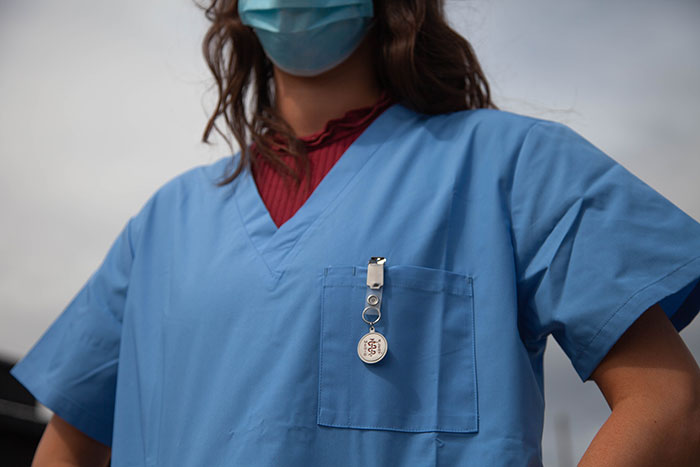
Image credits: markko79
#3
I was a junior doctor working in neurosurgery back in 2008 when one of the senior registrars (I suppose the equivalent is chief resident in the USA) told me his most unfortunate moment. In order to have a patients head stabilised for surgery he was using a frame that had a set of 3 spikes that held the head in place. Due to the angle he needed to approach from, this required the patient to be face down. As he was placing the head of the anaesthatised patient on to the frame the head slipped and his eye landed on to the spike, perforating the eyeball. Panicking and thinking that his career was now over, he then (rather bizarely) started poking at the eyeball trying to work out what was what until the anaesthetist told him to stop. They then called the ophthalmologist who came to tidy up what was now a completely ruined eye. After the surgery, terrified, he went to explain to the patient what had happened. Understandably fearing the worst, anger, distress and tears, received the response of "that's OK I was blind in that eye anyway!".Luckiest bastard ever
TLDR: Surgeon perforates patients eye by mistake. Patient doesn't care
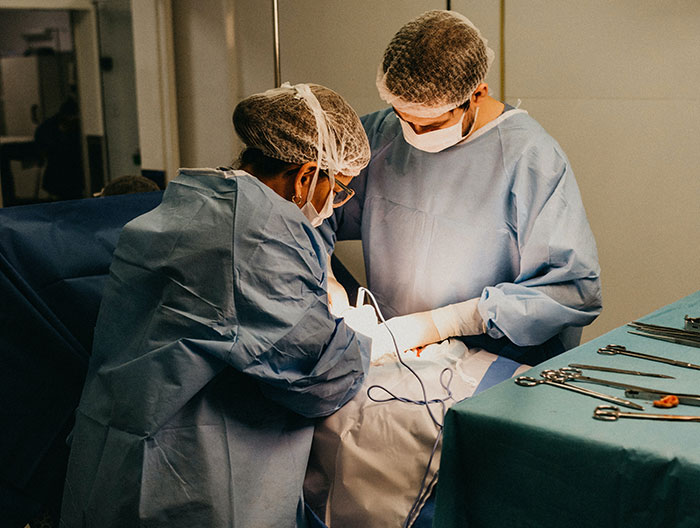
Image credits: ugm9mjh
Communication and leadership skills are an important part of being a good surgeon, however, not everyone focuses on these skills.
"Unfortunately, many surgeons do lack that 'bedside manner,' mostly because they do spend most of their time with their customer under anesthesia. But it is crucial that surgeons spend the time necessary with the patient both before and after surgery, as well as family and loved ones, to explain what to expect, what might happen, and how to recover best."
#4
This one's from my dad:We were putting up a central line for a drip with an 18G needle (1.2mm- relatively big compared to most needles) in the patient's external jugular, and all of a sudden the needle went right into the jugular. We all started panicking because usually with a drip the needle is meant to come out and only the plastic remains, but now we had lost the needle **inside** this guys jugular.
Before we could even fish it out it was gone, I looked at the fellow surgeons and nurses and before we could do anything we rushed him right into theater. After a few minutes we fished the needle out near his subclavian vein- closer towards the shoulder- and we breathed a sigh of relief.
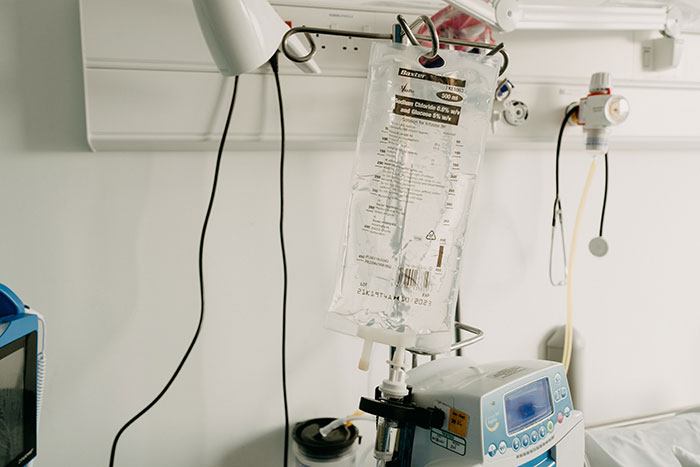
Image credits: DrShlomo
#5
When my nurse accidentally gave my patient a lower dose of anesthesia during a heart surgery I was performing and the patient opened his eyes and screamed during the operation so we had to stop it... Scary s**t.
Image credits: Sandy_Ramen
#6
I wasn't present for this, but I got to deal with the fallout. Client brings his cat (found as a stray) to be spayed. The vet (my boss) preps cat for surgery and begins cutting...and can't find the uterus or ovaries...Uh oh. Cat is a male! And poor kitty just had his belly sliced open for no reason whatsoever. The owner was, understandably, *furious*.
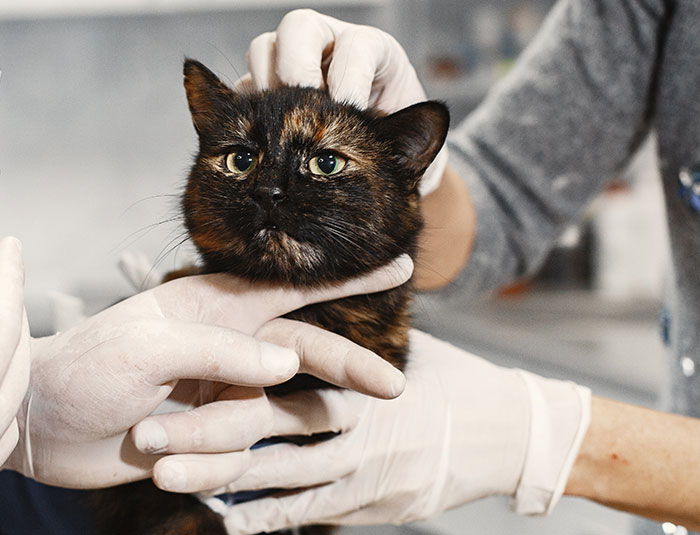
Image credits: almightyshadowchan
According to Dr. Carroll, staying cool under pressure is a skill, just like any other. Though some individuals find it easier than others due to their temperament.
"There are some people who are, by nature, explosive, and no matter how hard you work at it they can't be changed. But most people can be trained (much like soldiers) to remain calm, cool, and focused even under the greatest pressure," the medical expert shared with Bored Panda.
"Doctors and surgeons MUST develop the skill because we are often, even daily, left making decisions or performing procedures which ultimately decide life or death. It is this cognizance of the importance of our positions (and making sure to remember it every day) that creates the greatest physicians."
#7
Not a surgeon, but I'm a medschool student. A student two years older than me dropped a brain tumor on the floor on the first surgery he ever went on. The surgeon laughed at him, then told him to leave his operation room. He was devastated and never saw that surgeon again! But he still got a good evaluation for that rotation...!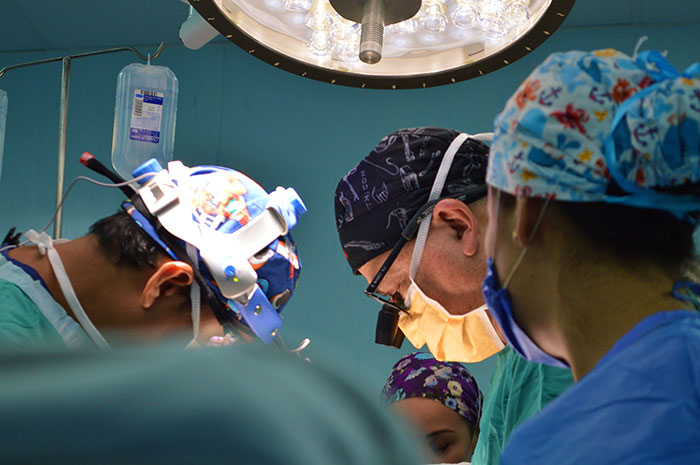
Image credits: Capucine25
#8
My brother is a dentist. So most of his stuff is very low key, filling cavities, fitting braces, etc.So what happens the one time he does dental surgery on a 19 year old girl in a operating theater? She has a allergic reaction to the aneasthetic, and he and the anesthesiologist battles for 10 minutes to stabilise her.
#9
I wasn't the surgeon involved in the case, but a patient had a bump on his leg. After imaging, it looked like it was an abscess collection that needed drainage.The patient was taken to the OR and the subcutaneous tissue dissected off. All of a sudden blood starts squirting. Turns out the abscess was really a femoral artery aneurysm.
Overhead Stat call for the vascular surgeon to bail him out.
There are plenty of good reasons to become a surgeon. You help a lot of people. There’s a lot of prestige and social capital attached to this particular career (similar to becoming a lawyer, really). And the pay is pretty darn brilliant.
For instance, in the United States, the average surgeon’s salary in June 2022 was $413,470. The salary range is roughly between $349,666 and $490,721. In other words, all the hard work in medical school, all that practice, and those sleepless nights, they’re well compensated once you actually start working in earnest. However, the job requires nerves of steel, a steady hand, and a great ability to think on one’s feet.
According to the Royal College of Surgeons of England, surgery is a very competitive field, so you ought to think about your career path well in advance.
#10
Resident neurosurgeon here: complications happen, not commonly, but not uncommonly. Some of them can be fixed intraop (like Jack from Lost and his durotomy story, which sounded dramatic but are usually more a nuisance than anything) and it's like nothing every happened. Other errors, permanent neurologic disability or death. I've never had a non-emergency case die in the OR, but other serious complications happen. One time, a year or so ago, a more senior resident was putting in an EVD and the patient (who seemed sufficiently unconscious because of her intracranial hemorrhage and some sedatives) suddenly thrashed her head around. Suddenly, instead of the drain being 7 cm deep, in her ventricle, it was 12 cm....into her brainstem. Under my mask, I reflexively gasped. Got a CT, saw a massive hemorrhage, rushed her to the OR to evacuate. She survived, but couldn't move, speak, understand, or essentially interact with the world around her in any meaningful way. Scares me the most just because it's such a routine procedure that went so wrong.#11
My specialty is the lower extremity, so there aren't too many things I can screw up that make you say "oh s**t" and all hell breaks loose. But, the one that immediately comes to mind was when I was chief resident and was doing an ankle fracture with a junior resident. Nothing crazy where the bones are sticking out, but definitely needed to be opened and repaired. So the resident was dissecting down to the site of the fracture on the inside of the ankle and was getting close towards the back part of the ankle where all the tendons, veins, and arteries are. So she points out an area that was part of the joint capsule that needed to be opened up to visualize the fracture and asked if it was ok to proceed. It was close to the artery but it looked ok from where I was standing, so I said go for it. As she goes to make the cut, she accidentally bumps the other leg with her arm and it falls off the OR table. The circulating nurse promptly picked the leg up and put it back on the table. Then, I look back at the surgical site and start seeing a massive amount of blood rushing out of the wound. Immediately I thought "f**k, she hit the artery!" As I'm getting ready to start looking for the source of the bleeding, my nerves calm down and I realize the blood is dark and not real bright-indicating it wasn't arterial blood flow. As it turned out, the other leg falling down hit the tourniquet and caused it to deflate which let the flood gates open up. Once the tourniquet was reattached, everything was all right.#12
For laparascopic surgery, there are many different ways of putting in your first port. One of the common ways is a veress needle which is a blunt tipped needle that you basically place blindly into the abdomen to insufflate it. It becomes very hard to use on fatter people because of the layers you have to go through. I once placed the needle and got back through it pulsatile bleeding (you are supposed to get nothing). I pulled it out and reinserted it and finally got it appropriately placed. I insufflated the abdomen and placed my port. When i looked around, i found about 500cc of fresh blood. "Oh S**t..." I found a needle hole through small bowel mesentery (its blood supply) but... no bleeding from there.... ok... i flip it over and reveal a midline retroperitoneal hematoma. The most notable content of the midline retroperitoneum is the Aorta. I had stuck a big needle into this patients aorta. Lucky for me, it seemed to tamponade off and stopped expanding. I just held pressure and prayed. a CT angiogram afterward revealed a hematoma in front of the aorta but not much else. Whew!“Surgery is an extremely enjoyable, intellectually demanding, and satisfying career, and many more people apply to become surgeons each year than there are available places. Those who are successful have to be ready not just to learn a great deal, but have the right kind of personality for the job,” they write.
Specialist knowledge and good physical skills alone aren’t enough to get ahead. You also need to have excellent communication skills, the ability to understand people’s concerns, and a way to earn their trust. What’s more, you need to be a leader, inspire your colleagues, and have the emotional resilience to weather difficult circumstances.
#13
Not a surgeon, but as a nursing student we did clinical rotations in the OR. Well a girl had come in to have a cholecystectomy (removal of the gallbladder) Well the doc had cut her open and was searching for about an hour and half when he finally declared that the girl did not have a gallbladder. He called up the radiology guys and told them his findings. The dude claimed he was looking at her ultrasound and could see the stones clear as day, to which the doctor informed him that he was actually in the chick's body and no gallbladder could be found. Turns out she had had it removed when she had an appendectomy in '99 and that doctor had neglected to tell her.#14
I worked at a Lasik surgery joint, way back. Lasik can restore vision by reshaping irregularities on someone's cornea. You sit under a large laser machine, and the first step is to cut a flap on the cornea. (the clear membrane your eye sits in). It is supposed to be a FLAP, that lies back down and heals. This is accomplished using what is essentially a surgical grade cigar cutter. A Micrombiter. This doc did about 15 surgeries that day, and on the last one, he cut the flap completely off. No fix for this. The guy, who had essentially come I to improve his long distance vision, called every day for 3 months, raging. He had signed the release tho, and was now $2000 poorer, and blind in one eye. The video of the procedure captures the surgeon's reaction. 'Well, it's in God's hands now.'TLDR: don't let docs slice stuff off your eye, unless it is life threatening. Too risky for appearance sake only.
#15
Thoracic surgery intern checking in!I was still a young intern when this happened. Young enough that the senior surgeon wouldn't let me perform the whole surgery (under his supervision, of course), but old enough to be allowed to do parts of the procedure.
So, I was doing (in my mind) a pretty decent job of dissecting a branch of the right pulmonary artery, freeing it from the cancerous nodes around it, when, suddenly, dark blood pulsing rose. That was like the tide coming up, only way quicker. My brain froze and I said "oh, s**t." I had perforated the pulmonary artery, a very fragile organ with 2.5 liters of blood per minute in it.
Well, my senior was the zen master he always is. He put his finger on the breach, which stopped the bleeding, and looked at me, winking, and said :
— Well, Taltyelemna, you're in deep s**t now, aren't you ?
He stitched the pulmonary artery and finished the procedure. While that history isn't as horrifying as others in the thread, it was my first "oh, holy shite" moment.
The NHS stressed the need for physical stamina, superb hand-eye coordination, and a calm temperament. Moreover, surgeons must have “first-class” time and resource management, all for the sake of the patient.
However, if you fail to become a surgeon or think that the career is far too stressful for you, just remember that there are thousands of ways to contribute to society and help make the world a better place. To those Pandas who chose the path of the surgeon, we salute you. At the same time, we support everyone who does their best in whatever profession they feel they were called to.
#16
Veterinarian here, a little late to the game...First: Working overnight ER as a fourth year vet student. Dog comes in with major trauma. We hook up the ECG leads, using isopropyl alcohol. We have a bottle of water-based lubricant for the leads, but it always walks away from the machine, and there wasn't time to find it. Watching on the screen when the patient goes into ventricular fibrillation, so the supervising resident grabs the paddles. The good news was, we put the fire out. Bad news, the dog didn't make it.
Second: Fourth year student again, observing an orthopedic procedure. The surgery resident leans over to see a structure that the operating surgeon is pointing out, and her glasses fall off, right into the wound bed. The surgeon says "F**k this!", drops the leg, and storms out of the OR. The resident is blind and crying, and I'm trying to disappear into the scenery.
#17
I asked my grandfather, a surgeon of 30+ years, this exact question once. He told me a story about opening a patient up to fix something serious with his aorta (it's been 10 years since I heard the story, details a bit hazy). Anyway, he and the other surgeon, who happened to be my mom's godfather, opened the guy up for this dicey operation and found several significant tumors. Like "well s**t... This guy is toast" tumors. He said he'd never seen so much cancer. They went out to tell the family, went back in, and as they were trying to figure out what to do the aorta dissected and he bled out with the two of them shouting and trying to clamp it. He said it was over in seconds. He felt bad but the guy was facing a pretty painful death anyway. He figured that there was less suffering that way, but secretly I think he was upset that they couldn't save him.#18
A while back I was doing a hysterectomy and staging for cancer (I don't want to give too many specifics for privacy purposes). We had the uterus, cervix, tubes and ovaries out and we had her abdomen open from sternum to pelvis. We were WAY down in the corners of the pelvis digging out lymph nodes when we found one about the size of a tennis ball with several large (and abnormal) blood vessels running in and out of it. We had to get it out but the blood supply was coming right off of a major vessel and was really hard to access. We clipped as many vessels as we could reach and then started cutting it out. We lost a full liter of blood in the next 60 seconds before we got full control of the bleeding and lost a total of four liters in the case. At one point the pelvis was filling with blood faster than the suction could get it out. Scary is hell at the time but it turned out ok.#19
General surgeon, five years experience.Maybe not my biggest, but one of my first Oh-Shits once I'd been set loose upon the world was just realizing that I couldn't be in two places that I desperately needed to be at the same time.
There's a certain vulnerability that happens when you're scrubbed in on a case in the OR. You're the captain of this particular ship, right now, and you really should have your whole focus dedicated to it and only it...
But sometimes you're in there in the middle of the night or on a weekend, and your partners are all gone and there's just a skeleton crew running the hospital. Your goddamned pager keeps going off and your phone keeps ringing and sometimes it's just Nurse X on the floor who thinks her patient really, really needs an order for Tylenol at 2 AM even though the patient is asleep...
Sometimes the call is about how your patient is actively dying. Now. Right now. Heart attack. Stroke. Blood painting the walls of the room.
Everyone trying to communicate this to you is in the process of either trying to stop the dying-ness, or is just freaking the f**k out and begging you to come DO SOMETHING.
But you are elbows-deep in the viscera of another very ill person. You can't really just drop what you're doing and race upstairs. You have given an equally strong promise to both of these people that you will look after and protect them from harm--and you have to break that promise to one of them. You have to keep sailing that particular ship, otherwise both will go down.
If you're lucky there's an ICU team that can swoop in and help... or residents experienced enough to handle things... or a back-up partner who can ride to your rescue and b***h about "having to help out Junior all night" later.
Other times, there is literally nothing you can do except tell the nurse, "Do what you can. I'll be up as soon as I'm done with the operation."
#20
Not a surgeon, but I was observing a hand surgery about a year ago at a teaching hospital. The surgeon was removing one of the carpals (the bones near the base of the hand) to be used later. A nurse was given the carpal to hold until it needed to be used. She ended up dropping the patient's bone on the ground.#21
Since I'm guessing there aren't too many surgeons on reddit during the middle of a Monday, I'll throw in what I have.Surgical nurse here. I was an OR nurse for a very short time in between two jobs in hospital surgical units taking care of post op pts. Right now I'm in a surgical step down unit, which means really sick post op pts who aren't *quite* sick enough for the ICU, but could still start tanking any minute. Most of our "oh s**t" moments are pretty boring, like "oh s**t, they found more cancer," "oh s**t, his oxygen percentage is going down," "oh s**t, there's a mucus plug obstructing her airway," things like that.
In the OR, the worst I saw was some shithead optometrist who thought spending 5 minutes per patient was a good way to do cataract surgeries (most surgeons spend about 15-25 min per surgery). At one point he told me to keep the pre and post op eye drops uncapped, because he didn't want to have to wait the literal 5 seconds it took me to unscrew the caps after each surgery. The patient's eyes looked all mangled and misshapen after the surgery, whereas every other cataract surgery I've ever seen, the pts looked fine right afterwards. Not really an "oh s**t" moment, but I told my boss after that day that I never wanted to work with that guy again. It was an accident waiting to happen. I heard one of his patients got an infection and lost their eye, but most of them were fine. Still, I wouldn't have let him watch my goldfish for a week long vacation, let alone come at my eye with a knife. He was a douchenozzel.
#22
My mom had gone in for surgery. Because the hospital didn't have what they needed they had to have an essential part for the surgery shipped to them. The day comes for the surgery and my mom is prepped, the OR is prepped, the surgeon took the day off from his practice, and my mom is put under. The part they needed (a fluid I believe) arrived and a nurse said, "We never ordered that." And sent the guy away. This is after my mom was under anesthesia. She said when she was being brought out of it she could see the surgeon losing his s**t on these nurses and all them crying from how bad he flipping out on them. Rightfully so...those nurses at THAT hospital suck. The surgery was moved elsewhere and that was the last time he worked with that hospital.#23
Craziest: probably a medical student passing out face first into the wound, then falling backwards and cracking his skull on the floor. He starts bleeding from the head and isn't moving. Just total silence for a few seconds. We didn't know whether to laugh or yell at him or what. Heh. Luckily I didn't have to have that talk with the family.Favorite: when I was a student my chief resident was sleeping with one of my friends who was also a student. We were both operating with the chief of surgery when someone pages the chief during surgery. The nurse looked at it and said it wasn't important. Chief gets annoyed and asks her I just call it back. She replies it was a text page, would he like her to read it? He says yes.
It was my friend telling him she wanted to meet him in a call room after he was done. (paraphrasing here). Another awkward silence. Residents sleeping with students is a no no and having them page you in surgery is one too. But the chief of surgery was having an affair with the nurse, we all knew it, so after a rapid fire exchange of significant glances around the table, we all shut the hell up and finished the case and never spoke of it again.
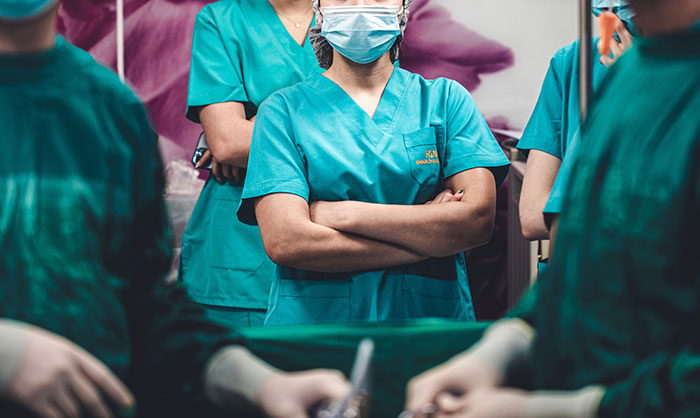
Image credits: 911Hawk
#24
Not quite a surgeon, but somewhat medical. I was bisecting someone's leg (deceased) and i did not know that said person had a metal rod through their femur. Proceed to cut through the bone with a metal saw. Sparks fly and my blade broke. Luckily I was standing off to the side, instead of directly behind the blade, as it flew backwards and hit the wall. The clothes the person had been wearing were lying underneath the body and caught a spark. I doused it with the water hose before a large flame could start, but still an "oh s**t" moment.#25
Way way back in the day pre-op was done with alcohol-based cleaners. Naked, sedated guy with a light sheen of cleaning fluid on him + static electric spark = fully engulfed in flames. Everyone just stood there for a second til someone grabbed a sheet and put out the flames. Surgery went well, no complications, slight sun tan.Balboa Navy Medical Center, San Diego, old surgeon. EDIT: ...was the original source of this, via his student now doctor my friend. Incident may have happened elsewhere.
#26
I was rounding a few months back and a guy gets wheeled into ICU smelling terrible. I walked over, and the dude had maybe the most macerated legs I have ever seen. There were things moving on the bed, and the suction container was full of maggots.Turns out dude had been weaving on the road, and when police pulled him over and opened the doors, maggots fell onto the road. He got taken to the ER, arrested, taken up to ICU and very rapidly debrided, then bilateral above-knee amputated. He actually made it out of the hospital, but I cannot imagine waking up one day and having no legs.
I really wish I knew where he was driving, though ...
#27
Yeah, this really happened to me when I was in training to be a cardiologist. I was in my 2nd or 3rd heart procedure/catherization when my senior doctor got sick, ripped of his surgical gown and ran out of the room. The doctor had just yelled "Oh , no!" and left. I had just positioned these catheters with wires into the sleeping patient's heart. They were just hanging out there pulsating to his heart beat.Apparently, the doctor had gotten food poisioning and made a run for the bathroom...never to return.
So I've never made it to this point in the procedure before and am just wondering where to take it from here. I haven't even been taught how to take them out safely. I'm looking at the vitals and monitors like F#@%, what do I do now? Of course they page my senior cardiology fellow in training who is taking a nap and not returning any pages or calls. No other doctors around.
Finally, thank GOD, my tech/assistant who has done these procedures since before I was born gives me a nudge to flush the catheters, which I do, to prevent blood clots and death essentially. And after a few minutes properly removes the catheters and wires.
They get treated like s**t but have saved ALL of the fellows in training and senior doctors many, many times in complicated situations with their knowledge.
#28
The medical stuff really becomes a blur. Complications, bad outcomes, crazy patients... I dunno, but after a few years even the bad stuff just becomes part of the routine. But there was one moment that still sticks with me from training...I was called into a meeting with the program director, which is never a good thing, and I wasn't entirely sure why. He makes some small talk, then start asking about one of the junior residents who had been on my service. Definitely one of the weaker residents, but hard working and likable. I start talking about her performance and her relationship with the other residents, her strengths and weaknesses, etc.
After a minute I came to the horrible realization he wasn't just asking about her, he was gathering ammunition to fire her and I was part of the firing squad. I jammed on the breaks and tried to talk her up, talking about her work ethic, and how well she got along with the nurses and the team. But we both knew it was a done deal before I sat down.
I dunno why it bothered me so much, compared to kids who burned to death and the like. But that sudden realization while I was sitting there that someone I kinda liked personally, who had spent most of their adult life struggling in undergrad, medical school, and the lab, who had what I suspect was six figure debt, was about to get their career destroyed just stunned me.
I don't know if she was going to be an unsafe doctor. I think the fact we liked her allowed her to slide further than she should have, in retrospect. But of all the terrible things that happened in residency, that's the one I think about most often.

Image credits: is-not-a-doctor
#29
This is less "oh s**t" scary, and more "oh s**t" s**t.As a medical student I got to assist in the repair of a vaginal a**l fistula, basically a connection between the two that meant the poor patient was leaking s**t out of her vagina. Given the nature of the operation the operating room smelt so horrific the anaesthetist actually had to leave because they were dry heaving so much. Towards the end of the operation we had to flush out the remains of the colon, and so I flushed saline through whilst the consultant surgeon stood at the end of the table with a bin bag. Once we were done the surgeon looked at me with a totally defeated look in his eyes, up to his elbows in s**t and said "I have a really f*****g glamorous job".
So that is my "oh s**t" moment.
#30
I was in charge in the unit the other day, and this happened...We had a patient in the ICU who had some big abdomen trauma. He had gone to the OR and was too sick to be able to close his abdomen, so we left it open. We had a piece of plastic covering, like a bag, covering his intestines and then we placed a vacuumed sponge dressing on top of that, called a woundvac.
The patient's nurse called me into the room to look at the abdomen because she thought she saw pieces of the bowel seeping out of the bag and getting sucked against the woundvac. I agreed and thought the bowel looked pretty dusky as well, so we called the doc to come and look at it.
The resident agreed and talked to his attending who told him to take the woundvac off, tuck the bowel back into the bag it had escaped from and put a new woundvac on.
It all just sounded like it was going to be a disaster, but whatever.
So, resident comes in, takes off the woundvac and the bowels had become very swollen from the fluids, trauma, etc... so when he took the woundvac off, they all slipped out of the patient. The bag had dislodged significantly. We would tuck the bowels in one side, they'd spill out the other. Here we had this guy in his bed, disemboweling and we simply could not get everything back in him, in the bag, or anything.
Luckily, the drugs we had the patient on kept him very nicely sedated and we had other drugs to control any problems with his blood pressure and the guy wasn't overtly bleeding... it was MESSY. We really just had to step back and say "Well, s**t. How do we get this guys guts back inside him!?"
Ended up having to call in 6 other people to help tuck things here and there until he could get back to the OR for them to get everything back into its proper place...
**TL;DR: Guts. Guts everywhere.**
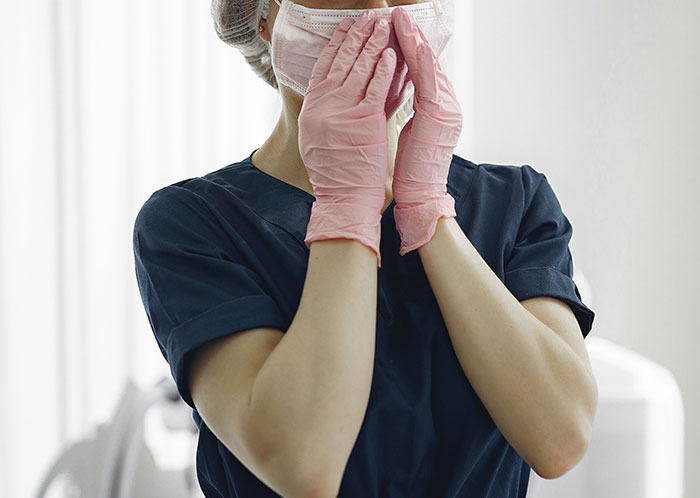
Image credits: anon
#31
"When I was in residency my first solo procedure was a spinal surgery on a sixteen year old kid, a girl. And at the end, after thirteen hours, I was closing her up and I, I accidentally ripped her dural sac, shredded the base of the spine where all the nerves come together, membrane as thin as tissue. And so it ripped open and the nerves just spilled out of her like angel hair pasta, spinal fluid flowing out of her and I... and the terror was just so crazy. So real. And I knew I had to deal with it. So I just made a choice. I'd let the fear in, let it take over, let it do its thing, but only for five seconds, that's all I was going to give it. So I started to count: one, two, three, four, five. Then it was gone. I went back to work, sewed her up and she was fine.":)
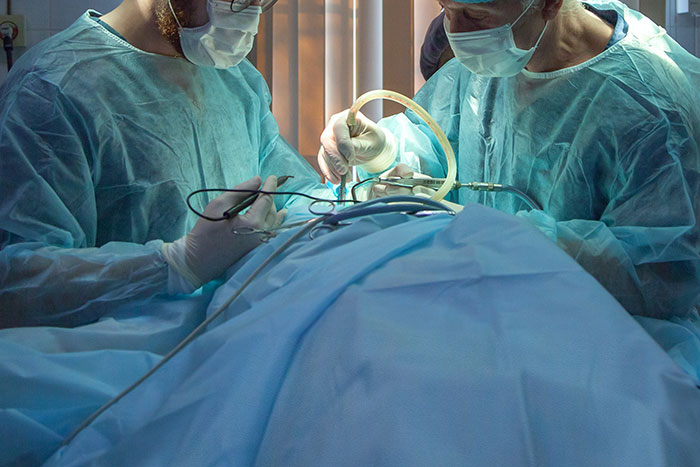
Image credits: anon
#32
I was doing research on tracheostomies and I had the good fortune to follow around a surgeon as he was performing a few. It was the first one that he was doing for the day and the first one I was to see, so I scrubbed in to observe. It was an interesting experience to see how they prep the patient and make the initial incision. Having performed the majority of the operation, minus the final cut, he wanted to show me a little bit about the anatomy. While using the scalpel as a pointer, he shows me a few areas of interest. Moving on, he starts to point to another area and says "it is very important that we take great care that we don't cu..." "oh f**k". He had cut into a major artery, I think it was either the common carotid or the inferior thyroid, but he had to cauterize the wound and stop the flow of blood. I quickly left the operating room after that and we never spoke of it again.#33
Veterinarian here. This happened in my 4th year of vet school. I watched a bull stomp his own intestines.A very valuable bull had an obstruction in his intestines that needed to be removed. People will only put the amount of money a food animal is worth into surgery to fix it so we had to do this on the cheap. Full anesthesia on an animal that big is crazy expensive so we did a "standing" surgery. What that means is the bull is put in a chute, numbed up really well, and other than light sedation they are totally awake and standing for surgery.
So the surgeons make a 2-3 foot vertical incision in his right flank and start pulling out armfulls of intestines and handing them to me and the other vet student assistants. There's a sterile drape on the bull and we're all in full sterile gowns. The obstruction was pretty bad so they had to remove a couple feet of damaged intestines and then sew the ends back together. There is a lot of blood. A lot. The bull is starting to get stressed, impatient, and weak from blood loss. It starts kicking at the chute and trying to move. It gets more sedatives and the surgeons try to sew faster. Everyone is sweating and there's a lot of swearing going on. The puddle of blood at our feet is getting bigger. The bull does a side shuffle and the intestines being held by another student are trapped between the bulls ribs and the metal bars of the chute. This is bad - even a few seconds of this can do permanent damage. The bull is too heavy to just shove over so they remove one of the side rails of the chute to free the intestines. The bull is getting really pissed off and now is trying to lunge from side to side and we are ordered to let go of the intestines we are holding to keep the bull from breaking our arms against the rails of the chute.
The bull is really freaking out and manages to get partially and then completely out of the chute and starts running around the room mooing and stomping and ripping huge chunks of intestines out of itself. Blood and guts are EVERYWHERE. GALLONS of blood. Keep in mind this room is in a barn and while the area around the chute was clean the rest of the room is covered in hay and dirt. Some huge guys manage to subdue the bull and wrestle it to the ground and they give it more sedatives and pain meds. My job was to sit on his shoulder, another bigger student is sitting on his head. Everything is a complete f*****g fiasco at this point and I just felt so terrible for the poor bull who was bellowing non-stop. They wash off his mangled intestines as best as they can, stitch the ends together, dump a s**t ton of penicillin in his abdomen and close him up.
The bull survived surgery and then was hospitalized and got tons of IV antibiotics and fluids and care. Every day his temperature got higher until he finally died a week later from a massive infection in his abdomen. So that was awful. I have absolutely no idea what they told the owner. As far as I know no one got sued.
Edit: thanks so much for the gold!
#34
My first C-Section was quite the shocker, but after that not a lot fased me anymore. This event occurred during one of my internships as a highschooler to see if medicine would be my field. Why, I'm not sure, but they let me attend a C-Section.They placed me at the feet of the woman that was numb chest down. I give her a little nod and the operation starts. Well, no one had thought to tell me that once the belly is cut, the liquids go out too. This is a logical thing, but I was seated at least 3 meters from the feet of said woman and the fluids gushing from her abdomen came all the way to my feet. Here is me, standing in a woman's pregnancy fluids. Oh. F**k. I must have looked very shocked because the other surgeons had a laugh about my reaction. Ever since, I've not been shocked once.
EDIT: spellings are hard.
#35
My wife's grandfather had surgery to remove scar tissue from his bowel due to a prior surgery. A hospital representative came out to my wife and her grandmother after the surgery and asked for them to come into a private meeting room. The doctor came in and said that he had dropped her grandfather off of the operating table and onto the floor while operating. He ended up being fine and is alive and well today. I'm sure the doctor had an "oh s**t" moment when it happened#36
Not a surgeon, just a respiratory therapy student.I have a few stories. I got a good opportunity through my aunt to intern in an e.r. at the age of 17 who is a respiratory therapist as well. She told them I was a student. This was all technically illegal because I had direct interaction with the patients through pure misunderstanding of the nurses trying to save their lives. So would not recommend. But I really value the experience.
Anyways it was quiet all night then we get a car crash victim, level 3 trauma. 18-years-old, John Doe who had run up under a semi on the freeway. Hes bleeding everywhere with a bad cranial laceration and severe internal hemmoraging. Collapsed lungs. Broken everything. Bad bad bad. Im standing there trying to be out of the way freaked by the sudden urgency. Doctors standing at the foot of the bed directing calmly. Well all of a sudden a nurse grabs me and tells me to write down his stats and give it to my aunt. I scribble them on my hand. This gets me mistaken as part of the team and next thing I know doctor is calling for a bilateral chest tube. Syringes are on the ground and the nurse needs help. She calls to me and I hold the tube in for her while she tapes. Fml. Next stop the O.R. My aunt jumps on top of the guy and starts compressions. We get up there and this kid is sliced open immediately. Surgeons are trying desperately to sew things up so this kid doesn't bleed out. Im helping to transfuse blood. Im literally white as a sheet at this point and someone yells at me to unlock my knees before I pass out. O2 sats come back... kid is losing blood too fast and isnt able to oxygenate the transfused blood quickly enough. Even if we save him at this point he'll be braindead. Ten minutes later they call it.
TLDR; First night interning at 17 and I just watched someone my age die. Lots of oh s**t....
Edit: Pardon if some things are off this happened 7 years ago and I have since left R.T. school.
#37
When I was an intern, I was assisting in an arteriovenous fistula using the brachial artery (ahm... something with blood vessels in the arm). Some part of the anastomosis (sewing) was tricky, and the vascular surgeon told me to not f*****g move a f*****g inch. I was holding a suture in each hand, and also balancing a retractor on my thumb.For some reason he loosened the arterial clamp for a bit... and a precise (almost as if he had aimed!), forceful gush of blood hit my face full.
I'm proud to say I didn't f*****g flinch; I calmly said "hey, when you have a minute, I probably should change my mask". He was concentrated and hadn't caught on to what happened; he began to ask why as he lifted his face from the patient's arm to me... Then, he burst out laughing, and told me to go get cleaned out. He took the sutures and retractor from me (I was keeping my eyes closed, but wouldn't have been able to see through the bloody glasses anyway), the nurse wiped my face and glasses and changed my mask, and I sat back down to carry on.
The two med students who were watching were absolutely stoked. Afterwards I heard one saying to the other "man, one day blood will totally gush on *us*!". I miss surgery, it was so much fun.
#38
Worked in an OR for a couple years as a biomedical engineer. Sprinted to the room when equipment wasn't working right or (more often) the surgeon or anesthesiologist didn't know how to use the equipment (this happens SO much). With about 70 OR's this was a fun day.1.) A surgical table was malfunctioning going into full trendelburg (table tilts to a serious angle...) was tilting on its own and patient was sliding off the table the whole surgical team was holding on to the patient as i run in.. The fix was I slammed the controller against the floor a few times. Patient was ok, but blood everywhere...
2.) A resident was putting in a trochar and mis-placed it, sliced open the AORTA...12 hours of surgery to repair, she was going in for a simple procedure.
3.) Surgical robot froze in a case, had to reboot. But the arm was grasping a main blood vessel. So we didn't want to reboot for fear the arms would re-home and let go of the vessel. Also, we lost video when it froze so we couldn't just retract the instruments. Lots of people saying oh s**t oh s**t... I am the one pushing the power switch so if it tears out someones organs they all look at me..
4.) Brain surgery, microscope video feed crashed, I was trying different video connections to get the overhead monitors back up, but everytime i accidentally hit the scope with my hand causing vibrations that were pretty magnified while working in the brain... He told me to never mind and to get the f**k out... This was my first day so its ok...
Many many more... OR's are a scary place, but fun and exciting job for sure. Rewarding to save the day while a team of surgeons/nurses/PA's all thanking you profusely!
#39
Late to the party buy why not.I was a patient in hospital a few weeks ago. I went in on the Saturday night and had doctors looking at me all night telling me I had appendicitis. No worries, that's a pretty routine procedure.
Surgeon comes in in the morning and looks at me. Touches my stomach and is like "c**p! Why didn't you get me in earlier? That's a strangulated hernia. We are getting him to surgery righy now!"
A bunch of embarassed doctors and me sitting there like 'c**p c**p c**p what the balls is a strangulated hernia. Am I going to die?'
I didn't die.
#40
This happened to me while placing an IVC filter (a small metal filter that sits in the inferior vena cava to prevent blood clots from traveling from the legs to the lungs). The procedure basically includes tunneling into the femoral vein and traveling up into the vena cava where you leave the filter in place. In order to confirm your location in the body you have to use a radio lucent contrast and an XRay to light up the vena cava since you are basically looking from outside of the body. The scrub tech hands us 100cc of contrast and we inject it straight into the vena cava and watch on the X-ray while nothing lights up as it's supposed to. Not able to figure out why we couldn't see it we ask for another 100cc of contrast and again shoot it into the vena cave with no luck. At a loss as to what could be going on we think maybe that the contrast is bad and we draw up some more and look at the syringe under the X-ray before injecting this time. Of course the syringe does not light up and while we are trying to get some new contrast in the OR the patient on the table who is sedated and intubated begins to seize. We finally look over at the scrub techs table and realize what she has done and turns out she was drawing up 100cc (twice mind you) of lidocaine, a quick acting anesthetic which is not supposed to be injected directly into the central circulation of the body. Luckily the patient was not permanently harmed due to this medical error but I was working with a very seniored vascular surgeon at the time and I've never seen her look the slightest bit phased by anything she's seen but when she realized we gave the patient that much lidocaine she looked like she was about to faint.TLDR: injected 200cc of lidocaine straight into the heart thinking it was contrast and caused a patient to have a seizure
#41
Mine isn't as gruesome as some these, but I figure I can share.I have several herniated discs, pinched nerve, spinal spondylosis, etc etc... Went in for a major epidural. Most people get 1-2, but I was getting 6. Basically, they put you under, fit a needle in-between your discs and give you a shot. Well, it might have been due to the fact that I was taking some HEAVY dosages of narcotics already, but I woke up on the table.
It was kind of hazy, but I was definitely aware. I could feel a slightly burning/ fuzzy feeling in my back. It felt like butterflies, when your leg goes asleep, and a there-is-something-scraping-near-on-or-on-my-bones feeling. I could see a screen with a live X ray looking thing. ( I found out the surgeon watches the screen to guide the needle.)
Just as I could feel like I may be able to raise my head, I came to the realization one of the nurses kept repeating, "He's awake!" Not too panicky, but definitely, like "Oh s**t". I wanted to tell her to relax, but by then someone walked up to one of the IVs and I was back to sleep.
All in all it was a win. I threw a b***h fit about how good the fruit juice was, so they gave me the whole container, and I tried to fight the nurses trying to dress me, because my girlfriend was waiting outside on me. She thought it was cute, so she obliged and brought me to Wendy's per my request. I then ordered over $20 of food, got home, and ate non of it.
Good times.
#42
Story from my vet: He was in a super run-down barn with a pregnant mare in trouble. She'd been getting up, lying down, and getting up again, but nothing was happening. Horse births are hell on earth (his words) because the foal doesn't turn until minutes before birth is supposed to happen, and if they're in the wrong position it's nothing in there but rigid legs and sharp little hooves and good luck getting that repositioned with 1000 pounds of frightened horseflesh in pain on your arm.So there he is, at night, up to his elbow in this frightened mare. She's not really into what's going on and doesn't want to stand for it. He's not terribly fleet of foot in that position, so it's up to the owner at her head to keep her calm, and that person is doing the best she can. Keep in mind this barn is in horrible shape. Really, just a dilapidated health hazard.
Well, the mare decided she'd had enough and tried to walk through the owner. I'm guessing there was a stud chain involved (a metal chain that loops around the nose, jaw, over the gums, or however you want to attach it so that you have more "persuasive" power over the horse). The owner was shoved off balance and managed to grab a live, uncovered wire. Why there was one in a barn I will never understand, but the result was that current flowed through her to the horse and into my vet. So now the poor guy is elbow-deep in a terrified mare while both of them and the owner are being electrocuted.
He didn't tell us how he got out of that, but the mare was okay and she delivered a live foal. They named the filly Electra.
And that was when I first began to think maybe I didn't want to be a horse vet after all.
